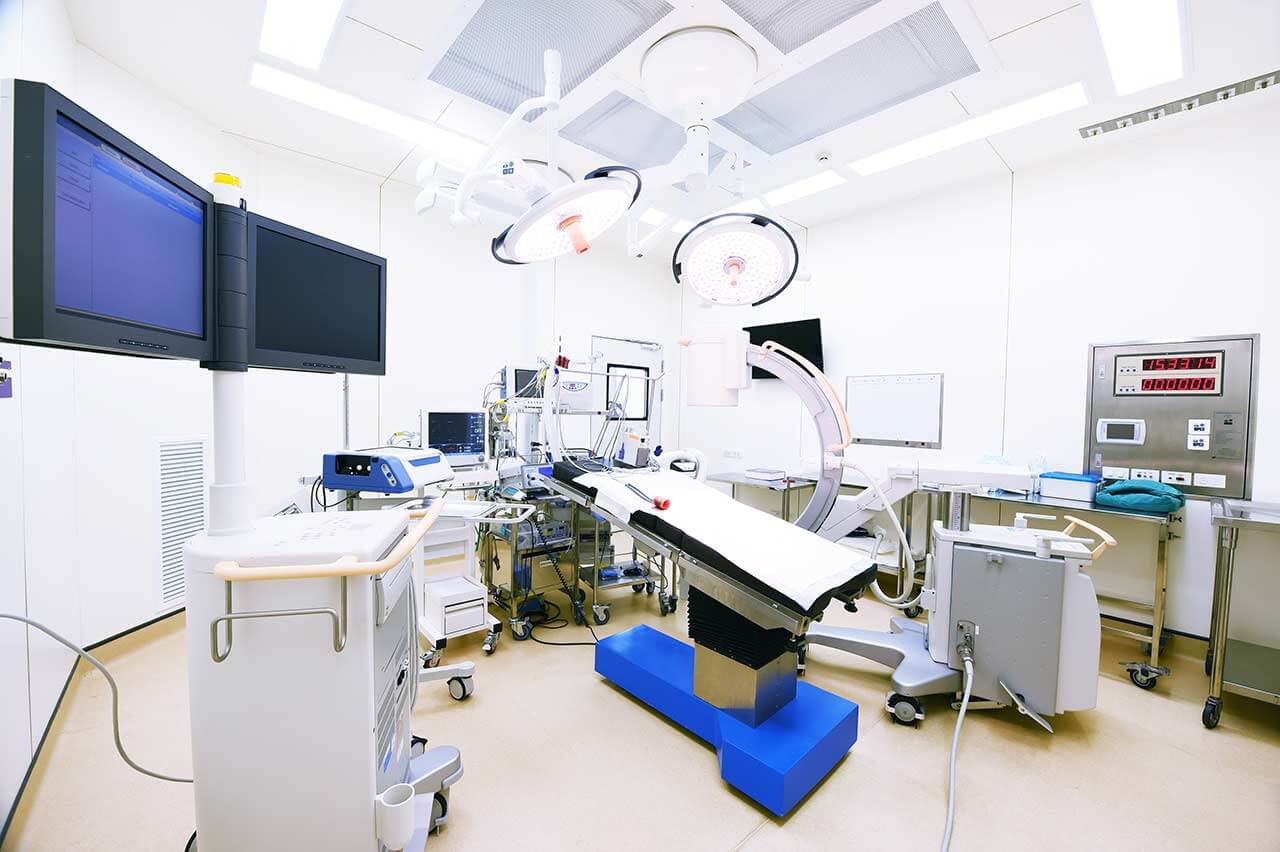
The program includes:
- Initial presentation in the clinic
- clinical history taking
- physical examination
- cardiological examination
- laboratory tests:
- complete blood count
- biochemical analysis of blood
- TSH-basal
- inflammation indicators
- indicators blood coagulation
- measurement of arterial blood pressure
- electrocardiogram
- Holter monitoring (24h)
- echocardiography
- transesophageal echocardiography
- preoperative care
- cardiac catheterization
- complete intracardiac repair (corrective surgery)
- symptomatic treatment
- control examinations
- the cost of essential medicines and materials
- nursing services
- full hospital accommodation
- explanation of future recommendations
Required documents
- Medical records
- Echocardiography (if available)
Service
You may also book:
 BookingHealth Price from:
BookingHealth Price from:
About the department
The Department of Pediatric Cardiac Surgery at the University Hospital Bonn offers the full range of surgical treatment of congenital and acquired heart defects. The department has various therapeutic options in order to ensure the optimal medical care for patients of different age groups, ranging from premature babies, newborns, young children, adolescents to adults with congenital heart defects. Many heart diseases can be detected even in the womb, therefore, the department holds joint consultations for future parents with the specialists in Prenatal Medicine and Pediatric Cardiology. The clinical practice is based on an interdisciplinary collaboration.
The department is headed by Prof. Dr. med. Boulos Asfour. The specialist made a significant contribution to the development of minimally invasive techniques and treatment methods for congenital and acquired heart defects using a combination of interventional procedures and open surgery (hybrid interventions).
The department has a special competence in the surgery for complex heart defects in very small premature and newborn children suffering from multiple developmental defects. For example, the department's surgeons skillfully perform the arterial switch operations, Sano modification of the Norwood procedure or aortic valve reconstruction after prenatal interventions. Special attention is paid to the use of ECMO in newborns. With appropriate indications, the doctors use the most sparing surgical techniques in order to ensure the fastest recovery of young patients after the surgery, minimal pain and risks. After the heart surgery, the child is transferred to the Pediatric Intensive Care Unit, where the specially trained team of pediatric cardiologists, anesthesiologists, cardiac surgeons and nurses provide all the necessary therapeutic measures.
The service range of the department includes:
- Septal defect surgery
- Atrial septal defect
- Ventricular septal defect
- Atrioventricular septal defect
- Bypass grafting
- Patent ductus arteriosus
- Aortopulmonary window
- Surgery for right heart diseases
- Tetralogy of Fallot
- Pulmonary valve stenosis
- Pulmonary atresia with ventricular septal defect
- Double outlet right ventricle
- Surgery for left heart diseases
- Aortic stenosis and insufficiency
- Mitral stenosis and insufficiency
- Surgery for сomplicated heart diseases
- Congenitally corrected transposition of the great arteries with ventricular septal defect and left ventricular outflow tract obstruction (ccTGA, L-TGA)
- Persistent truncus arteriosus
- Left coronary artery lesions from the pulmonary artery (anomalous origin of left coronary artery from pulmonary artery, Bland-White-Garland syndrome)
- Single ventricle heart surgery
- Right-sided modified Blalock-Taussig shunt
- Sano modification of the Norwood procedure
- Norwood operation "rapid stage"
- Glenn procedure
- Fontan procedure
- Surgical treatment of vascular anomalies
- Aortic isthmus stenosis (coarctation)
- Anomalous pulmonary venous connection (partial and total anomalous pulmonary venous return)
- Interrupted aortic arch
- Double aortic arch
- Special surgical techniques
- Reconstructive interventions with valve preservation
- Cone reconstruction in Ebstein's anomaly
- Aortic valve reconstruction using the patient's own pericardial tissue (modified Ozaki procedure)
- Hybrid interventions
- Minimally invasive surgeries
- Implantation of pacemakers and defibrillators, including revision interventions
- Extracorporeal membrane oxygenation (ECMO) in newborns
- Aortopexy
- All surgical procedures in adult patients with congenital heart defects, including the acquired heart defects in childhood
- Other medical services
Curriculum vitae
Higher Education, Postgraduate Training and Professional Career
- Medical studies at the Justus Liebig University Giessen.
- Internship in the Department of Cardiothoracic Surgery at the University Hospital Muenster.
- 1993 Research Fellow, Department of Pediatric Cardiac Surgery, Boston Children's Hospital, Harvard Medical School.
- 1996 Research Fellow, Johns Hopkins University School of Medicine, Baltimore, Maryland.
- 1998 Senior Physician in the Department of Pediatric Cardiac Surgery at the University Hospital Muenster.
- 2002 Beginning of work in the Department of Pediatric Cardiothoracic Surgery at the Asklepios Children's Hospital Sankt Augustin.
- Since 2006 Head Physician of the Department of Pediatric Cardiothoracic Surgery at the Asklepios Children's Hospital Sankt Augustin.
- October 2019 Headed the newly founded Department of Pediatric Cardiac Surgery at the University Hospital Bonn.
Research Interests
- Early repair of congenital heart defects.
- Organ growth stimulation in hypoplasia.
- Quality management of congenital heart disease treatment.
- Single ventricle defect repair.
Teaching Activities
- Congenital heart defects, Semmelweis University.
- Congenital heart defects, University of Duisburg-Essen.
- Congenital heart defects, University of Muenster.
Memberships in Medical Professional Societies
- German Cardiac Society.
- German Society for Pediatric Cardiology.
- German Society for Thoracic Surgery.
- German Society of Cardiothoracic Surgery.
Photo of the doctor: (c) Universitätsklinikum Bonn
About hospital
According to the authoritative Focus magazine, the University Hospital Bonn ranks among the top ten medical facilities in Germany!
The hospital was opened on January 1, 2001, although in fact it inherits the medical facility, which operated at the Faculty of Medicine of the University of Bonn. The hospital in Germany combines all the highest standards of modern university medicine of the international level. A highly competent team of experienced physicians, which consists of more than 8,000 employees from various fields, takes care of the patients’ health.
The hospital has 32 specialized departments and 23 institutes, which implement the highest standards of treatment in Germany. On their basis, in addition to the successful clinical activities, the productive research and training of young specialists are carried out. Also, the hospital has 10 intensive care units and more than 30 cutting-edge operating rooms. They are equipped with the advanced surgical, navigation and monitoring systems, which provide sparing and the most effective surgical treatment. The total number of places for hospitalization is 1,250 beds.
The hospital presents all fields of medicine, while many of them are awarded by prestigious German and international certificates. For example, in 2007, the Comprehensive Cancer Center of the hospital became one of the four winners at the nationwide competition among Cancer Centers of Excellence. The research focuses primarily on the clinical genetics and genetic epidemiology, neurology, immunology and infectiology, hepatology and gastroenterology, and diseases of the cardiovascular system. The research findings contribute to the development of new therapeutic methods and overall improvement of treatment in Germany.
The main value for all employees of the hospital in Germany is human health, his individual needs and wishes, therefore, despite the high-tech infrastructure, the focus remains on the human attitude and respect for each patient.
Photo: (с) depositphotos
Accommodation in hospital
Patients rooms
The patients of the University Hospital Bonn live in cozy single, double and triple rooms, designed in bright colors. The standard room furnishing includes a comfortable bed with a remote control, a bedside table, a wardrobe, a table and chairs, as well as a TV and a telephone. Each patient room is equipped with an ensuite bathroom with toilet and shower. The hospital also provides enhanced-comfort rooms.
Meals and Menus
The patients of the hospital are offered tasty and balanced three meals a day: breakfast, lunch and dinner. Every day each meal features three different menus, including a vegetarian one. If you for some reason do not eat all the food, you will be offered an individual menu. Please inform the medical staff about your dietary preferences prior to the treatment.
Further details
Standard rooms include:
Religion
Christian priests are available for the patients at any time. Representatives of other religions may be requested at any time.
Accompanying person
Your companion may stay with you in your room or at a hotel of your choice during the fixed program.
Hotel
You may stay at the hotel during the outpatient program. Our employees will support you for selecting the best option.
The hospital offers a full range of laboratory tests (general, hormonal, tests for infections, antibodies, tumor markers, etc.), genetic tests, various modifications of ultrasound scans, CT scans, MRI and PET / CT, angiography, myelography, biopsy and other examinations. Treatment with medications, endoscopic and robotic operations, stereotaxic interventions is carried out here, modern types of radiation therapy are also used. The hospital offers patients all the necessary therapeutic techniques.
- Surgical treatment of the brain tumors, tumors of spinal cord and spine
- Replacement of all joints, resection arthroplasty
- Deep brain stimulation and vagus nerve stimulation in patients with epilepsy
- Multimodal complex treatment of Parkinson disease
- Thoracic endovascular aortic repair (TEVAR)
These are benign and malignant breast pathologies, malignant tumors of various localizations, neuromuscular diseases, stroke, retinal pathologies and various visual impairments, infertility, autoimmune diseases, epilepsy, coronary artery disease and myocardial infarction, leukemia and other pathologies.
- Ophthalmology
- Epileptology
- Reproductive medicine
- Hematology and oncology
- Neurosurgery
Over 8,000 highly qualified doctors and other employees work at the hospital.





